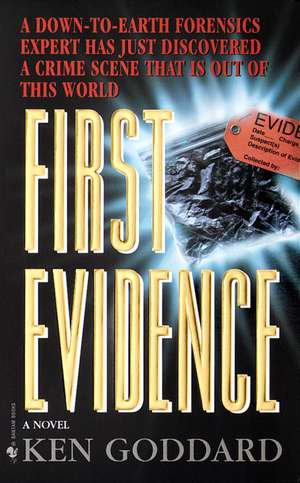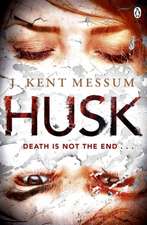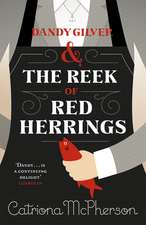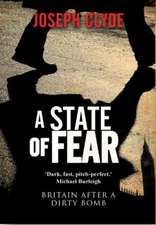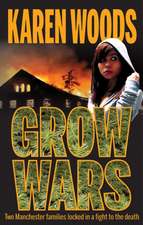First Evidence
Autor Ken Goddarden Limba Engleză Paperback – 31 ian 2000
In criminal forensics they train you to uncover evidence, no matter how brutal or bizarre the murder.
But what if one night you make contact with a crime scene so terrifying, no one on earth can explain it?
It begins at a chaotic crime scene in the deep woods of the Pacific Northwest--site of a reported shoot-out. Investigator Colin Cellars cannot find a trace of perpetrator or victim--or even confirm that anyone has been killed. As he doggedly pursues the case, he realizes there is far more at stake here than murder. Someone--something?--will stop at nothing to prevent him from discovering the truth. For the truth is not "out there." It is locked away in Cellars's own evidence file. The evidence points to a killer far outside Cellars's experience--far outside any earthly experience. But who will believe one maverick cop?
From the New York Times bestselling author of Balefire comes a chilling tale of murder, forensic detection, and vivid speculation, pitting a unique crime scene investigator against a culprit who may be unlike any this world ever spawned....
Preț: 50.53 lei
Nou
9.67€ • 10.09$ • 8.11£
Carte disponibilă
Livrare economică 20 februarie-06 martie
Specificații
ISBN-10: 0553579134
Pagini: 464
Dimensiuni: 108 x 174 x 26 mm
Greutate: 0.22 kg
Editura: Bantam Books
Notă biografică
Extras
No sound of an approaching vehicle echoing in the cold, crisp mountain air.
No crunch of gravel--or even dried-out pine needles--giving way under a heavy tire or boot.
No muted beeping of tripped sensors.
No creaking floorboards.
No whispered voices.
Nothing whatsoever.
Or at least nothing perceptible to any human senses.
And certainly nothing to make Bob Dawson think he might be in any kind of danger from someone--or some thing--trying to break into his cabin.
Which was an interesting concept in itself, because if anyone had ever bothered to ask him, Dawson would have responded--without the slightest sense of deceit or bravado--that he honestly couldn't remember the last time he'd felt threatened, much less afraid, of anyone or anything.
He'd been like that for as long as he could remember. First as a scrappy kid with lightning-fast reflexes and a seemingly permanent set of bruised knuckles and bloody nose. Then as an adrenaline-loving Army gunship pilot who made the easy transition to federal law enforcement, flying drug interdiction missions for the DEA. And now as a medically retired ex-federal agent turned bodybuilding Oregon hermit, thanks to a mysterious air crash that had never been satisfactorily explained to anyone--especially the DEA. Six months later, they were still searching the Marble Mountain Wilderness area in northern California for the remains of their supposedly shattered and burned helicopter.
But setting those minor discrepancies aside, if you were looking for someone tough, smart, aggressive, and flat-out crazy enough to take on the local school bully, the mob, biker gangs, low-flying drug runners, or just your average malicious two-bit asshole--face-to-face, single-handed, no backup necessary--then Bob Dawson was definitely your man.
If you could find him.
Which wasn't an easy thing to do, as four tired, confused, discouraged, and thoroughly pissed-off Internal Affairs investigators from the DEA would have been more than happy to testify.
Of course, they hadn't thought to look for him in a cave on a privately owned 320-acre parcel of forested land located at the far end of a rarely used logging road that had been turned over to the county when the timber industry went belly up several years ago. Which was just as well because there were hundreds of such parcels in Jasper County.
Nor had it ever occurred to them that a retired DEA agent/pilot--and especially one who had supposedly just barely survived a brutal helicopter crash--might spend the next six months handcrafting then concealing a log cabin over the top of that cave without ever bothering to mention the fact to the Jasper County Planning Department.
All of which provided ample demonstration that the DEA simply didn't know their man.
In spite of his ready smile and outwardly gregarious nature, Dawson was very much a loner, a man who valued almost nothing--other than his dog and his memories of three childhood friends--more than his treasured solitude and privacy. The seemingly endless succession of pretty and adventuresome young women who briefly crossed his path found that out quickly, too. A few days, or a week or two at the most, was all it ever took for even the most dense or inattentive of them to discover the underlying reality. In spite of all outward appearances, this ruggedly handsome, muscular, humorous, artistic, and enticingly dangerous man was a person very much out of place and out of step with the surrounding world.
Born in the wrong state, and in the wrong century. That's what everybody had told him from as far back as he could remember. Should have popped out of his mama's womb in the middle of the Texas Panhandle or the Missouri Breaks, rather than the mountains of southern Oregon. Back in the time and place where the concept of one riot, one marshal, a damsel in distress, and not even a prayer of a backup, really meant something.
Which is one hell of an ironic twist, when you stop to think about it.
From his crouched position in the far corner of his cabin, Dawson stared numbly at the torn and bloody carcass of his dog. The malamute's lifeless eyes stared back, questioning and accusing. How did we end up in this situation? Your fault or mine?
Ironic as hell, because there isn't a distressed damsel within twenty miles of this place, or at least none that I know of, and I could sure use some backup right about now.
He felt a drop of sweat--or maybe it was blood, he couldn't tell which, and really didn't care--start to slide down his cheek, and he instinctively readjusted his hands around the polished walnut grip of the ancient but fully functional revolver. Couldn't risk a slip now because his first shot had to be dead on the money. Might not be time for a second shot because whoever or whatever it was, and wherever it had gone, it was too damned fast.
Might even be faster than the damned bullet for all I know.
Dawson blinked in confusion at the thought. Then a chill ran down his spine as he turned his attention for a brief moment to the weapon he was holding in an instinctive, straight-armed, two-handed combat grip.
But he really didn't have to look. Now that his attention was focused, he knew it by feel. His treasured model 1873 Single Action Army Colt "Peacemaker." The very same make and model of revolver that Colonel George Armstrong Custer's men carried at the Little Bighorn. And loaded with ancient, balloon-head, copper-cased ammunition dating back to Custer's disastrous fight with Sitting Bull's Sioux and Low Dog's Oglala warriors: a .45-caliber, 250-grain soft-nosed lead bullet sitting in front of forty grains of FFg black powder.
Translation: a big, slow, and undependable bullet.
Shit, I should have gone for the Smith. What the hell's the matter with me?
But then he glanced across the basement, in the direction of his open bedroom, where his modern Smith & Wesson .44 Magnum revolver lay beneath his pillow, and remembered. The far more lethal weapon--with its deafening concussion, and incredibly fast and reliable hollow-point rounds--had been a good two or three seconds away from where he'd tumbled to the floor.
No, that's right, I wouldn't have made it. Good decision, he told himself as he readjusted his grip again. He was vaguely aware that his arms and wrists were starting to get tired, but he had no idea why.
Thinking about his other weapon options caused Dawson to realize that his right shoulder was pressing against the heavy octagonal barrel of his Sharps rifle--a weapon made famous by the fictional Matthew Quigley--and the shorter rounded barrel of his Sharps Military Carbine. Both weapons were chambered for the middle-finger-sized .45-70 cartridge--which meant a substantially bigger, faster, and harder-hitting projectile--and thus a serious temptation, given the unknown nature of his now-barricaded intruder. It would be easy to twist around and grab one of the unloaded rifles. But the Sharps were single-shot weapons, and slow loaders to boot. And the dozen black powder cartridges he'd carefully hand-loaded for each weapon the old-fashioned way were secured in wrapped-up canvas cartridge belts hung over the trigger guards, so he quickly pushed that option out of his mind.
Colt single action's a fine gun, long as I don't have to reload. Gotta forget about that goddamned fool Custer and stay with my instincts. Only way I'm going to get out of this room alive.
He understood now, much too late, what his subconscious mind had been complaining about all along: that he and the dog would have had a much better chance if he'd actually possessed some sense of what sphincter-loosening fear was all about. Given that insight, he might have looked up immediately from his nearly completed portrait when the dog uttered his first warning growl that, in retrospect and from the protective subconscious point of view, had sounded inexplicably wrong from the very start.
Instead, he'd waited until the instant after the dog suddenly gave out a frightened, high-pitched yelp, then looked up just in time to see his fiercely loyal canine companion being flung backward in an explosion of blood. An explosion that had splattered bright red streaks across his hands and face, and the Baroque-style painting he'd been working on, with his characteristic single-minded intensity, for the past two weeks.
He blinked in sudden awareness.
The painting.
Something about his latest artistic project had been tugging persistently at the recesses of his mind for some time now. Ever since that terrifying moment when he'd lunged for the nearest loaded handgun hanging on his wall and thrown himself backward into the nearest corner of his cabin basement, every survival instinct he possessed on full adrenaline alert.
That had been what, almost five o'clock?
He allowed his eyes to glance quickly over at the face of the ancient grandfather clock, and blinked in shock.
Two hours ago?
Christ, he thought as he readjusted his grip again, no wonder I'm getting shaky.
He had gone back to work on the painting a little after four in the afternoon, intending to put in a couple more hours on the critical shading, and then fix a light dinner before driving his four-wheel-drive truck down the mostly dirt and gravel access road into town. Plenty of time to link up with Colin Cellars--a long-lost childhood and college buddy whom he would be seeing in person for the first time in almost fifteen years, thanks to the persistent efforts of Jody and Malcolm--and explain exactly what kind of amusement he'd set up for the both of them with Jasper County's most infamous collection of resident fruitcakes on this particular cold and gloomy Friday evening.
Dawson had smiled in anticipation, anxious to get Cellars's opinion of his latest find--both of them, actually--although he figured he already knew what his forensic scientist buddy would think of his incredible new lady.
You never change, Dawson. That's what he'll say. The exact same thing Jody said before she walked out too, Dawson remembered with a pang of guilt. And he'll be right. Shit.
But reasonably certain that scientific curiosity, if not the shredded remains of their youthful friendship, would keep Colin Cellars from walking out on the scheduled lecture--or the subsequent examination of his newly found evidence--Dawson had set to work.
For over an hour, the only perceptible sounds inside the remote mountain cabin had been the sighs of the sleeping malamute and the faint whisper of fine-pointed brushes against previously dried layers of carefully blended pigments as Dawson concentrated on his work, determined to get the details exactly right.
He was good at that sort of thing: focusing every bit of his energy and attention on the intricate details of whatever matter was at hand with a degree of patience that, at times, seemed almost inhuman. He always had been, as far back as he could remember. Evidence of that God-given talent covered the walls of his log cabin basement.
The faded newspaper photos of his high school and college athletic triumphs.
The glossy image of the mangled Apache Attack Helicopter that he'd somehow kept in the air and gotten back to base in spite of the nearly severed control cables, the rapidly faltering hydraulics, the furiously whining and smoking engine, and the mostly shredded airframe.
The twelve-string guitar.
The numerous intricate pen-and-ink sketches of Western heroes, villains, horses, and lethal weaponry.
The dozens of combat handgun-shooting trophies.
And the guns themselves, hung from every available peg hook on the rough-hewn log walls of Dawson's cabin:
The single action revolvers, all dating from the mid-to-late eighteen hundreds. Each resting in its own authentic leather holster rig--many of the belts glistening with neatly aligned rows of polished .44- and .45-caliber brass cartridges in tight-fitting leather loops--which Dawson had lovingly hand-tooled and stitched himself, and which glistened from a thin protective film of gun oil. And each fully capable of delivering a lead slug on target at twenty-five yards with deadly accuracy; a slug that could tear a man's heart out of his chest or simply kill him from the hydrostatic shock of an impact almost anywhere on his body.
The modern tools of his profession that he kept near his bed: a shoulder-holstered Smith & Wesson .44 Magnum revolver, a 9mm Glock semiautomatic pistol, and a blue-finished Remington 870 police model pump shotgun with extended magazine.
And the pair of nineteenth-century Sharps rifles--the long-barreled Buffalo gun, and the shorter-barreled Military Carbine--which could reach out on long parabolic arcs and kill with even more fearsome impact in the steady hands of an accomplished expert rifleman like Dawson.
They were, by any reasonable definition, a collection of historical authenticity, discordant beauty, and unquestioned lethality. And they were Bob Dawson's pride and joy.
But what the hell good are they in a situation like this? The familiar voice whispered from some back recess of Dawson's subconscious.
He ignored the unbidden thought--the unimaginable thought, actually--as he continued to sweep his eyes across the darkened, shadowy void of his catacombed basement workroom, focusing every bit of his mental energy in a determined effort to spot the shadow before it moved again.
Should have paid more attention to the dog. Listened to what he was trying to tell me.
But how the hell was I supposed to know he was going to be afraid of a goddamned shadow? Dog's never been afraid of anything in his whole life.
The images and sounds flashed into Dawson's mind. Unable to help himself, he allowed his mind to replay the chilling memory of how--for the briefest of moments--the malamute's fearsome growl had dissolved into a terrified whimper ... and how it had tried to turn away before ...
Before what?
Before the impossible happened?
Before a shadow killed him?
At that moment, it occurred to Bob Dawson that he knew what the intruder was, and what it wanted ... and he almost laughed out loud, because that didn't make the least bit of sense either.
Unless ...
He shook that thought off, fiercely intent on maintaining his focus, no matter how long it took, and determined not to give in to the demons flickering about at the outer limits of his imagination.
And besides, he reminded himself, whoever or whatever had entered his cabin and viciously butchered his dog--and was now stalking him for whatever reason--was definitely a "he" or a "she," not an "it." Had to be because ...
A discordant image flashed through his mind and almost caused him to void his bladder.
Get a grip on yourself, Dawson. Shadows don't ...
At that instant, the distinctively dark shadow rippled across the far wall, almost faster than the human eye could see. The movement jarred a framed pen-and-ink drawing out of alignment and caused one of the pistol-weighted holsters hanging from a small wall peg to start swinging as the shadow disappeared into the surrounding darkness.
Along with a forty-four-ounce, 1860's era, Remington New Model cap and ball Army revolver, apparently, because the swinging holster was now empty.
Bob Dawson blinked in stunned disbelief for the second time in as many minutes.
Another droplet, definitely sweat this time, slid down the right side of his cheek as he braced his muscular shoulders against the thick, solid, and supporting corner logs. He held the heavy, familiar, and now only vaguely reassuring Colt Single Action Army revolver out in a point shoulder position, hammer thumbed back to the full-cock position, and index finger pressed tight against the trigger, as his combat-trained eyes stared over the slightly trembling but still aligned sights, searching intently--even desperately--for the target.
A target.
Anything.
But the only movement in the semidarkened room was that of the still-swinging leather holster.
Steady, Dawson muttered silently to himself. It doesn't matter what you think you saw. Doesn't matter who or what it is, or what it's doing here. Unless it's got titanium plates for eyelids, it's going to die. Just lead and squeeze. Lead and squeeze.
It jarred him to realize that he was still using the less focused pronoun "it" rather than the more definitive--and reasonable--"he" or "she."
Like I'm supposed to be afraid of a freaky shadow, he complained to his inner voice.
Okay, fine, but even freaky shadows aren't supposed to do things like that, his inner voice responded.
Matter of fact, they couldn't do things like that.
But this one had.
I'll be damned. He blinked in startled realization as, out of the corner of his eye, he became aware that the pendulum-like swings of the empty holster had dampened down to a motion that was barely perceptible.
I really am afraid.
It occurred to Dawson, in a flash of incongruous amusement, that he really ought to make an effort to get hold of Colin Cellars--who, he suddenly remembered, was probably down at the auditorium right now, waiting for him to arrive--before it was too late. Let his ever-skeptical, puzzle-solving friend in on the real surprise of the evening: how incredibly easy it was to be afraid of something that wasn't even there.
Colin had to be told, Dawson decided. Definitely had to be told, because Colin Cellars was the only person he knew who might be able to make any sense out of something like this.
And more to the point, the only person in the world he trusted enough to try to explain something like this.
The question was, did Colin still trust him?
No, probably not, Dawson thought ruefully. And it's my own damned fault.
Another discordant image flashed through his mind. Four teenage faces flushed from exertion and joy in having worked together, piton by piton, handhold by handhold, to defeat the much-feared Windshear route up Gravestone Peak. Byzor, Catlin, Cellars, and Dawson. The intrepid four, arm in arm at the summit, staring into the camera, teamed up in junior high school by the happenstance of alphabetical order, and virtually inseparable for the next ten years of their lives ... until an ultimately irresistible Mother Nature tossed in her fateful monkey wrench.
Wish all three of you were here, right now, Colin old buddy. I really could use--
But then it was too late.
The shadow moved again, gun barrel and all, and the god-awful loud and blinding fireballs that seemed to erupt in all directions from Bob Dawson's ancient revolvers mercifully obliterated any sense of sight and sound.
Recenzii
--Booklist
Textul de pe ultima copertă
BUT WHAT IF ONE NIGHT YOU MAKE CONTACT WITH A CRIME SCENE SO TERRIFYING, NO ONE ON EARTH CAN EXPLAIN IT?
It begins at a chaotic crime scene in the deep woods of the Pacific Northwest -- site of a reported shoot-out. Investigator Colin Cellars cannot find a trace of perpetrator or victim -- or even confirm that anyone has been killed. As he doggedly pursues the case, he realizes there is far more at stake here than murder. Someone -- something? -- will stop at nothing to prevent him from discovering the truth. For the truth is not "out there". It is locked away in Cellars's own evidence file. The evidence points to a killer far outside Cellars's experience -- far outside any earthly experience. But who will believe one maverick cop?
From the New York Times bestselling author of Balefire comes a chilling tale of murder, forensic detection, and vivid speculation, pitting a unique crime scene investigator against a culprit who may be unlike any this world ever spawned....
